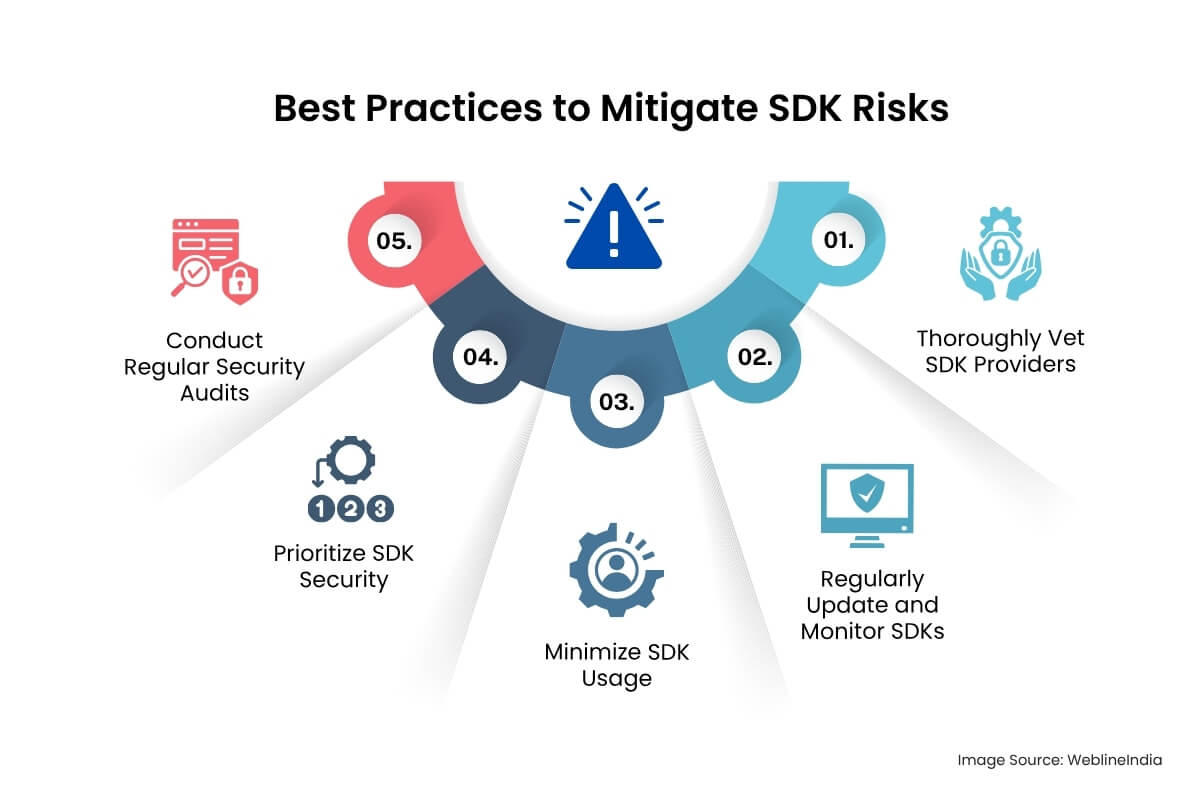Mobile app SDK integration has become a standard practice in modern SDK development. Developers frequently integrate third-party Software Development Kits (SDKs) to accelerate development cycles and introduce functionalities such as analytics, advertising, and social media integration.
However, this reliance introduces significant, often overlooked, risks that impact the overall SDK security and stability of applications. Understanding these risks is crucial for building robust and secure mobile applications.
Need expert help to secure your mobile app? Let’s talk and build it better!
What is an SDK and Why Use It in Mobile App Development?
A Software Development Kit (SDK) is a collection of software tools, libraries, and documentation that help developers integrate specific features into their applications. In mobile app development, SDKs are commonly used to add third-party functionality, such as location services, messaging, analytics, and in-app purchases. Popular examples include the Facebook SDK, Google Maps SDK, and Firebase SDK.
The primary appeal of mobile app SDKs is their ability to reduce development time and effort. Instead of writing complex code from scratch, developers can implement pre-built features with just a few lines of code. This allows for rapid prototyping and feature enhancement, streamlining the SDK development process.
However, while the convenience of third-party SDKs is undeniable, their integration into mobile apps comes with inherent risks that can compromise the performance, security, and privacy of the app.
Why Third-Party Mobile App SDKs Are Popular
Third-party mobile app SDKs provide pre-built functionalities, saving developers from reinventing the wheel. Common use cases include:
- Analytics SDKs (e.g., Firebase, Mixpanel)
- Ad monetization SDKs (e.g., Google AdMob, Facebook Audience Network)
- Authentication SDKs (e.g., Auth0, Firebase Authentication)
- Payment gateway SDKs (e.g., Stripe, PayPal)
A 2021 report by SafeDK found that the average Android app integrates 18.6 third-party SDKs, while iOS apps average 14.3 SDKs (Source: SafeDK Report). While these tools enhance functionality, they also introduce vulnerabilities in SDK security.
The Hidden Risks of Third-Party SDK Development
1. SDK Security Vulnerabilities and Data Leaks
Many third-party mobile app SDKs request excessive permissions, leading to potential data breaches. A study by AppCensus revealed that 42% of SDKs collect sensitive user data without proper encryption.
Common issues include:
- Hardcoded API keys in SDK configurations
- Man-in-the-middle (MITM) attacks due to weak SSL implementations
- Excessive data harvesting beyond declared permissions
2. Lack of Transparency in SDK Development
Most developers rely on mobile app SDKs without auditing their source code. Closed-source SDKs pose risks because:
- Undocumented backdoors may exist.
- Outdated dependencies can introduce vulnerabilities.
- Sudden deprecation by vendors can break app functionality.
Facing SDK security issues? Want a safer app experience for your users?
3. Performance Overheads and Stability Issues
Poorly optimized mobile app SDKs can degrade app performance. Common problems include:
- Increased memory usage leading to crashes
- Slower startup times due to bloated SDK initialization
- Battery drain from background SDK processes
An analysis by GuardSquare found that some ad SDKs increased APK size by up to 30%, negatively impacting user experience.
4. Performance Degradation and Instability
Beyond security, third-party SDKs can negatively impact application performance. Excessive resource consumption, memory leaks, and network latency are common issues. These problems can lead to poor user experience, app crashes, and negative reviews.
Inefficiently written SDKs can drain battery life, consume excessive data, and slow down application responsiveness. This becomes especially problematic on devices with limited resources. Moreover, when multiple SDKs are integrated, conflicts can arise, leading to instability and unpredictable behavior. Developers should perform thorough performance testing and monitoring to mitigate these issues.
5. Regulatory Compliance and Privacy
Regulations like GDPR and CCPA impose strict requirements on data privacy and security. Developers are responsible for ensuring that all SDKs used in their applications comply with these regulations. Failure to do so can result in hefty fines and legal repercussions.
Many SDKs collect and process personal data, requiring developers to obtain explicit user consent and provide clear privacy policies. The complexity of managing data privacy across multiple SDKs can be daunting. Developers must conduct thorough due diligence to ensure that all SDKs adhere to relevant privacy regulations.
Best Practices to Mitigate SDK Risks
While the risks associated with SDK security and SDK development cannot be entirely eliminated, there are several best practices that developers can follow to mitigate these threats.

1. Thoroughly Vet SDK Providers
Before integrating any third-party SDKs into your mobile app, it’s crucial to research the SDK provider’s reputation, security practices, and compliance with industry standards. Look for SDKs with strong community support and documentation, as well as transparent data handling practices.
2. Regularly Update and Monitor SDKs
Always ensure that you’re using the latest version of each third-party SDK and promptly apply updates or patches as they are released. Set up an automated system for monitoring the performance, security, and updates of the SDKs integrated into your app.
3. Minimize SDK Usage
Use the minimum number of third-party SDKs necessary for your app’s functionality. The fewer SDKs your app relies on, the fewer the potential security vulnerabilities and performance issues. If you can build a feature in-house, it’s often better to do so rather than relying on an external SDK.
4. Prioritize SDK Security
Before integrating any SDK, review its security features thoroughly. Does it support encryption? Does it follow best practices for data handling? How frequently is the SDK audited for vulnerabilities? These are critical questions to ask when evaluating SDK security.
5. Conduct Regular Security Audits
Perform routine security audits of your app, including its SDKs, to ensure no vulnerabilities are present. Third-party SDKs can change over time, and security issues can emerge even in previously safe SDKs. Stay proactive about securing your app.
SDK Development and the Path Forward
The process of SDK development itself must be approached with security as a primary concern. Developers who create SDKs should implement secure coding practices, conduct regular security audits, and provide clear documentation on data privacy and security.
Proper SDK security involves a layered approach. Implement secure communication protocols, data encryption, and robust authentication mechanisms. Developers should also provide mechanisms for developers to configure and customize SDK behavior, allowing them to tailor it to their specific needs.
WeblineIndia: Your Trusted Partner for Secure Mobile App Development
At WeblineIndia, we understand the complexities and risks associated with third-party SDK integration. Hire mobile app developers to prioritizes mobile app SDK security and performance. We conduct thorough due diligence on all SDKs, implement robust security measures, and adhere to industry best practices.
We offer comprehensive SDK development services, ensuring that your applications are secure, reliable, and compliant with relevant regulations. We provide transparent and efficient solutions, helping you navigate the challenges of modern mobile application development.
Build Secure Business Apps
While third-party mobile app SDKs accelerate development, they introduce significant SDK security risks. Developers must prioritize audits, minimize dependencies, and stay updated on vulnerabilities. For businesses seeking secure and optimized SDK development, WeblineIndia provides expert IT consultation for solutions to safeguard mobile applications.
Companies can mitigate risks and deliver secure, high-performing apps by adopting best practices and partnering with trusted providers.
Social Hashtags
#MobileAppSecurity #SDKRisks #AppDevelopment #CyberSecurity #DataPrivacy #ThirdPartySDK #AppPerformance #DevTips #MobileApps
Ready to launch a safer, high-performing mobile app? Let’s make it happen!
Frequently Asked Questions
Testimonials: Hear It Straight From Our Global Clients
Our development processes delivers dynamic solutions to tackle business challenges, optimize costs, and drive digital transformation. Expert-backed solutions enhance client retention and online presence, with proven success stories highlighting real-world problem-solving through innovative applications. Our esteemed Worldwide clients just experienced it.
Awards and Recognitions
While delighted clients are our greatest motivation, industry recognition holds significant value. WeblineIndia has consistently led in technology, with awards and accolades reaffirming our excellence.

OA500 Global Outsourcing Firms 2025, by Outsource Accelerator

Top Software Development Company, by GoodFirms

BEST FINTECH PRODUCT SOLUTION COMPANY - 2022, by GESIA

Awarded as - TOP APP DEVELOPMENT COMPANY IN INDIA of the YEAR 2020, by SoftwareSuggest